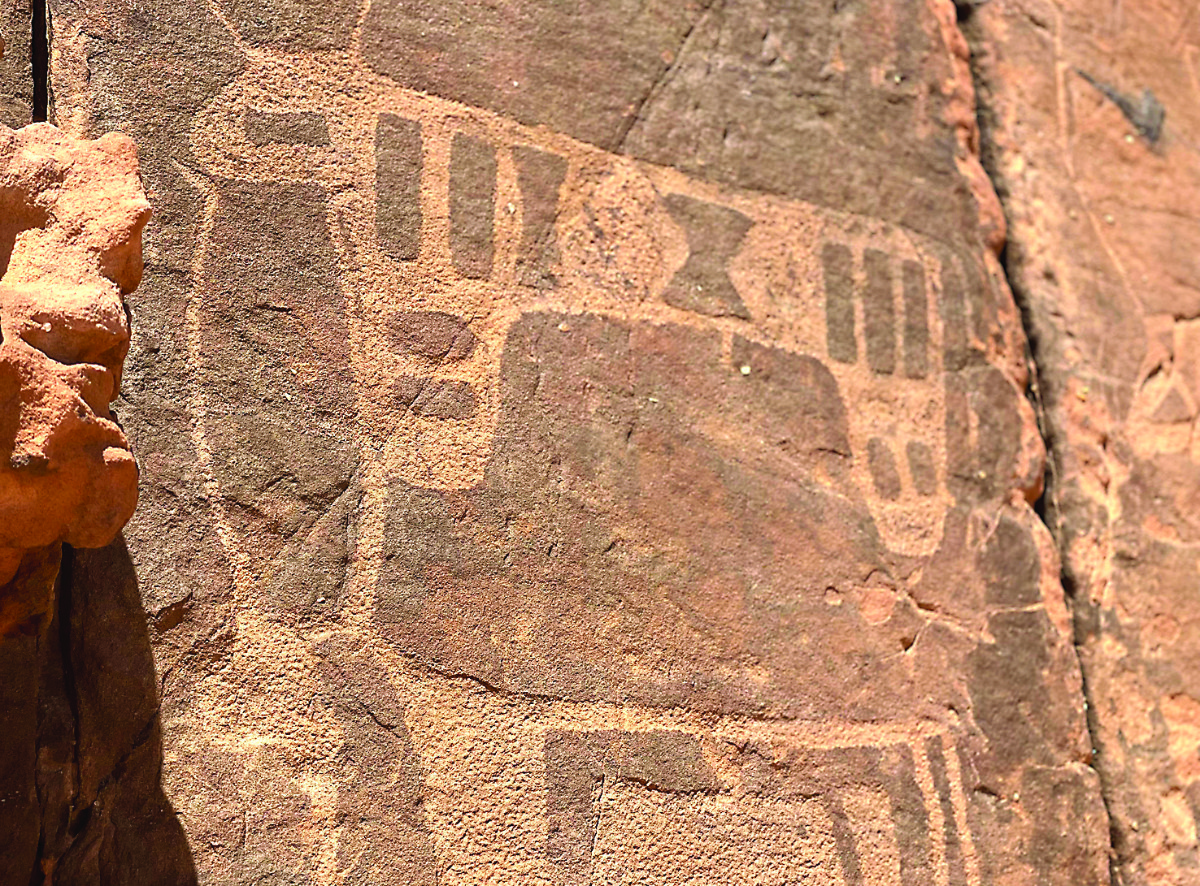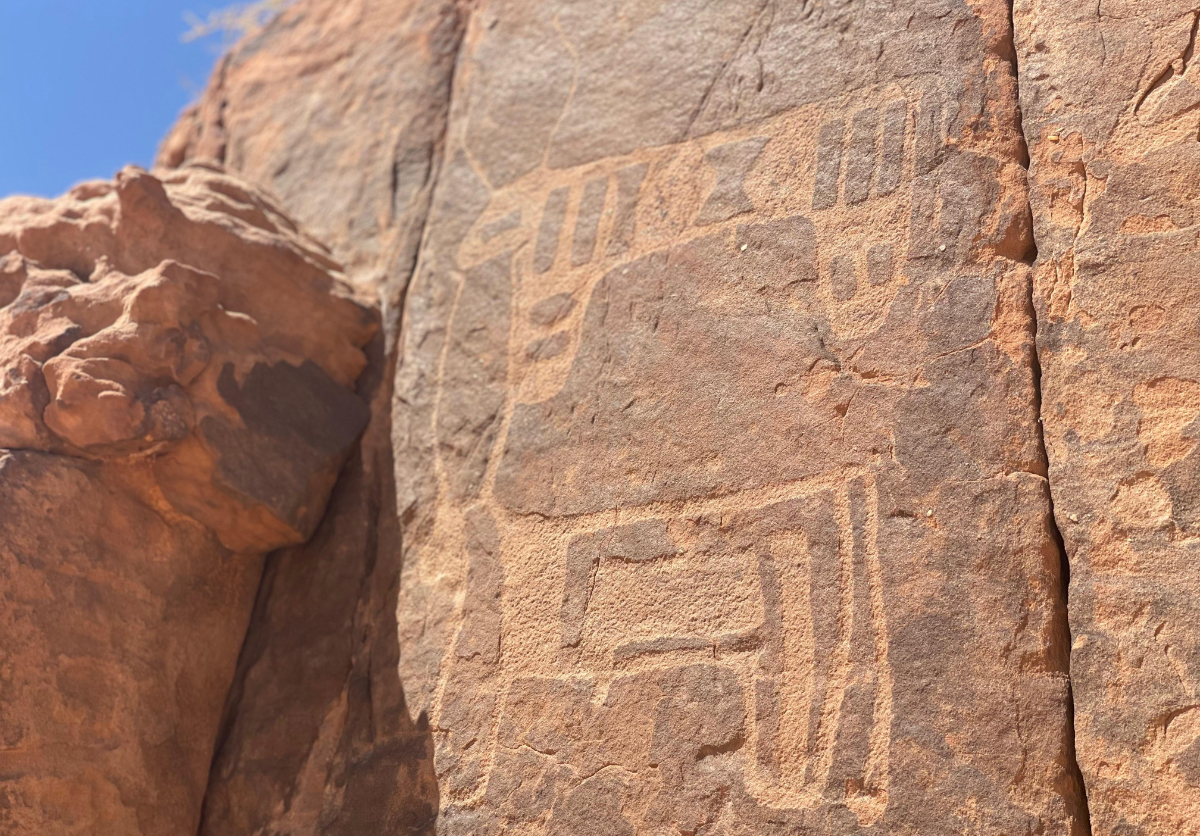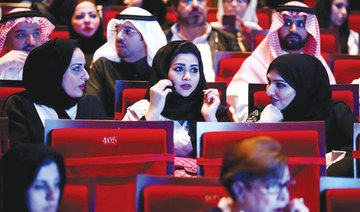JEDDAH: Effat University has hosted its fifth annual VDP Showreel, a film festival showcasing student productions and media projects.
The Showreel was organized by the university’s visual and digital production department on Monday under the patronage of Vice President of Board of Trustees and General Supervisor of Effat University, Princess Lolwah Al-Faisal.
The Showreel’s slogan was “Creating Cinema, One Frame at a Time.”
Previous Showreels have drawn praise from leading media figures.
“Your films show that you have one of the main tools for the fourth generation’s media wars. I am proud of what I have seen today and I am happy with these amazing young women with their great ability and bright future,” said Osama Haykal, former Egyptian media minister and president of Egyptian Media Production City.
The program included a VDP exhibition, a red carpet, a 90-minute movie screening made by the VDP Effat filmmakers at the Effat Film Theater, and a tribute to guests of honor.
Chairman of the visual and digital production department, Dr. Mohammed Ghazala, praised Princess Lolwah’s vision in founding the film school.
“No one was sure what would happen,” he told Arab News. “But it was a vision that is now a reality, and we have a film school, film students and film graduates.”
The guests of honor were consultant at the Royal Court and pioneering Saudi filmmaker Abdullah Al-Mohaisen; President of the Academy of Arts in Egypt, Dr. Ahlam Younes; Artistic Director of Dubai International Film Festival Masoud Amralla; Saudi producer Saleh Fawzan; Associate Director of the Tisch School in New York University, Patricia Pearson; and Saudi media producer Ahmed Alshugairi.
“We were impressed (by students’) courageousness in pursuing degrees in VDP at a time when there were no cinemas in the Kingdom,” Pearson said.
“VPD students and alumni, you are entering the industry at a very interesting and unique time, when your education and skills are going to be even more relevant and necessary than when you started the program only a few years ago,” she said.
Alshugairi was impressed with students’ work: “It’s a great start to see students who are passionate about this industry, whether animation, filmmaking, directing or scriptwriting — there is a nice variety.”
Saudi cinema’s rising stars in the frame
Saudi cinema’s rising stars in the frame

- 350 cinemas with more than 2,500 screens will be opened by 2030
- “Creating Cinema, One Frame at a Time.”
RCRC warns public against intermediaries offering assistance in applying for land use in Riyadh

- Any claims or messages published regarding the existence of entities that allow or facilitate applications are baseless, RCRC warns
- The Commission said it is developing an electronic platform dedicated to receiving land use applications directly from citizens
RIYADH: Beware of unauthorized individuals or groups offering assistance in applying for land use in the national capital, the Royal Commission for Riyadh City (RCRC) advised the public on Sunday.
The Commission issued the warning as it announced that it has begun implementing the royal directive issued by Crown Prince Mohammed bin Salman on taking practical measures to achieve balance in the real estate sector in Riyadh, the Saudi Press Agency reported.
The RCRC noted that it is currently working on developing an electronic platform dedicated to receiving land use applications directly from citizens without the need for any intermediaries or external parties.
Any claims or messages published regarding the existence of entities that allow or facilitate applications are baseless, the RCRC said.
The Commission also called on everyone to obtain information from official sources only, and to beware of any fraudulent attempts claiming to grant land outside the regulatory framework.
Crown Prince Mohammed bin Salman earlier directed a series of measures aimed at achieving stability in the sector.
Among these measures was the lifting of restrictions on land transactions and development in northern Riyadh, as recommended in a study by the RCRC and the Council of Economic and Development Affairs.
‘At the Edge’: Art Week Riyadh signals bold new chapter in Saudi cultural renaissance, say organizers

- Event organized by Visual Arts Commission and hosted at JAX District from April 6 to 13
RIYADH: Art Week Riyadh is making waves in the Saudi capital this week, with curators and creatives hailing the event as a pivotal moment in the Kingdom’s fast-evolving cultural landscape, the Saudi Press Agency reported.
Organized by the Visual Arts Commission and hosted at the JAX District from April 6 to 13, the event is bringing together local and international artists, curators, and institutions in a celebration of contemporary creativity and cross-cultural dialogue.
The initiative reflects the growing momentum of Saudi Arabia’s cultural transformation, part of the broader Vision 2030 reform agenda that is reshaping the Kingdom’s social and artistic fabric, according to organizers.
Vittoria Matarrese, Director and Art Curator of Art Week Riyadh, described the event as a significant turning point.
“We chose the title ‘At the Edge’ because it reflects the nature of the phase Riyadh is undergoing,” Matarrese said. “It is a city positioned between the desert and urbanization, between heritage and renewal. This balance is evident in the diversity of participation and the dialogues presented by the exhibition.”
She added that Riyadh is increasingly defining itself as a space where modernity and tradition intersect, enabling a unique creative evolution.
Shumon Basar, curator of the Public Cultural Program at Art Week Riyadh, underscored the importance of the conversations taking place as part of the programme, titled “How to Create an Art World: Lessons in Value.”
He explained: “Our goal is not only to share experiences, but also to raise essential questions about the types of value that art creates in the contemporary world—whether economic, symbolic, or social—and how art can serve as a tool to understand cultural transformations, rather than merely reflect them.”
Art Week Riyadh serves as a key cultural platform that embraces diversity and encourages artistic experimentation, offering a space for critical reflection on the evolving role of art in society, SPA added.
A look at NEOM’s prehistoric masterpieces etched in stone

- Open-air museum of ancient artworks is key to decoding past civilizations
- Drawings reveal how human beings interacted with now-extinct animals in the area
MAKKAH: In the heart of NEOM’s Hisma Desert, where sandstone mountains and plateaus rise from the arid landscape, is an extraordinary collection of ancient rock art and archaeological inscriptions. These priceless treasures illuminate the cultural and economic vitality of long-lost civilizations.
Once a vital corridor for caravans travelling the ancient trade routes of the Arabian Peninsula, this region preserves an invaluable legacy etched into its geological formations.

Abdulelah Al-Fares, a photographer and expert in ancient artifacts and a member of the Saudi Heritage Preservation Society, told Arab News that the rock art is in the mountains and plateaus in NEOM, part of a mountain range in the northwestern part of Tabuk.
Hisma Desert is bordered by the Sharah Mountains to the north, by Wadi Araba to the northwest, by the Hijaz Mountains to the west, and by Harrat Al-Raha to the south.
HIGHLIGHTS
• Studying rock art in the region matters deeply because it reveals economic and cultural changes that shaped the northern Arabian Peninsula.
• The drawings show how people interacted with now-extinct animals in the area, as well as with livestock and camels.
• Among the standout examples are life-sized camels crafted with remarkable precision and aesthetic detail.
“The plateaus, part of the Hisma Desert and its geological formations, represent an open-air museum of nature, ancient rock art, and diverse historical inscriptions,” he said.

The rock drawings feature engravings of human figures, animals and various scattered scenes throughout the site.
The engravings on the plateau’s facades depict scenes of animals, including wild animals such as camels, cattle, ibexes, ostriches and wolves, as well as other predatory animals, and depictions of hunting scenes and human combat.
These drawings are notable for their precision and have remarkably withstood the elements for thousands of years.
Abdulelah Al-Fares, Saudi Heritage Preservation Society member
“These drawings are notable for their precision and have remarkably withstood the elements for thousands of years,” he said. “Most of the themes and scenes in some of the rock drawings in the region are repeated and depict, to some extent, the world of wild animals and the interactions of humans through hunting and warfare.
“The mountains embody a civilizational and cultural legacy through their distinctive rock drawings featuring human and animal forms,” Al-Fares said.

He also highlighted the value of exploring NEOM’s ancient rock art. These carvings — depicting animals, hunting scenes and human figures — are a bridge between our modern lives and the world of humans thousands of years ago. They are a source of cultural and historical knowledge.
The artworks also illuminate the journey of human civilization, revealing its cultural and social evolution in the region.
Scattered throughout the area, a wide array of rock art sites show a vast and dense collection of drawings and archaeological inscriptions from different eras etched on mountain surfaces.
Al-Fares pointed out their diversity, noting the varied artistic styles, forms, and themes that distinguish each piece.
Among the standout examples are life-sized camels crafted with remarkable precision and aesthetic detail. The careful attention to detail is thought to underscore the camel’s role as an essential sources of food and transport in ancient times.
Another façade shows a herd of cows, all facing forward, their large crescent-shaped horns curving at the tips. Encircling this herd, human figures of varying sizes are skilfully carved.
These ancient artworks are pictorial panels of human history, activity, environmental adaptation, and cultural development during ancient times. Their value shines brighter given the scarcity of insights into prehistoric life.
Studying rock art in the region matters deeply because it reveals economic and cultural changes that shaped the northern Arabian Peninsula.
The drawings show how people interacted with now-extinct animals in the area, as well as with livestock and camels.
Many carvings portray human beings astride animals, including a warrior wielding a spear and sword, rendered with finesse and skill.
Scattered throughout the region, some drawings hint at the presence of different ethnic groups that lived in the area. The provide clues to migratiosn and trace the routes of trade caravans that used these locations as settlement points.
Riyadh forum to discuss future of project management

- The event will offer a platform for exchanging strategies to improve project outcomes by enhancing skills, streamlining operations, and using modern technology
RIYADH: Riyadh will host the fourth Global Project Management Forum from May 17 to 19, focusing on advancing project management and promoting innovation and sustainability.
Held under the theme “Next-Gen Project Management: The Power of People, Processes, and Technology,” the forum will bring together professionals from more than 100 countries to explore the future of project management and share new methodologies.
The event will offer a platform for exchanging strategies to improve project outcomes by enhancing skills, streamlining operations, and using modern technology, the Saudi Press Agency reported on Sunday.
The forum’s chairman, Badr Burshaid, said the goal is to provide practical solutions to challenges while encouraging collaboration across people, processes, and technology.
The event will include sessions and workshops on artificial intelligence, digital transformation, sustainability, global value chains, and leadership development, along with an exhibition and book signings.
The Saudi volunteer team that carries out emergency rescues in the Northern region

- Turaif Falcons Search and Rescue Association rescues stranded motorists, finds missing people and assists in medical emergencies
- Group recently helped evacuate severely overweight man suffering medical emergency in apartment
MAKKAH: A volunteer search and rescue team recently helped to evacuate a severely overweight man suffering a medical emergency in an apartment in Saudi Arabia’s Northern Borders region.
The man, weighing around 200 kilograms, was suffering from shortness of breath and low oxygen levels.
Due to the narrow staircase in the building — around a meter wide — the specialized team had to be brought in to evacuate the patient on a stretcher.
The team worked with the Saudi Red Crescent to safely transport him to a nearby hospital where he was placed on a respirator.
It was one example of a diverse range of rescue missions that the Turaif Falcons Search and Rescue Association regularly carry out.
Their work includes rescuing people from floods, assisting motorists stuck in the sand and locating people who have gone missing in the desert.
Operating under the Ministry of Human Resources and Social Development, they thrive in a spirited volunteer environment, committing their time, skills, and energy to community service while promoting a culture of volunteerism.
In an interview with Arab News, Mohammed Bashit Al-Ruwaili, head of public relations and media, and the official spokesperson for the association, said that the team is made up of over 150 dedicated volunteers, who play essential roles in multiple areas — most notably in supporting official agencies during search and rescue operations and contributing to life-saving efforts.
He emphasized that the team operates within a well-structured institutional framework, working in direct coordination with relevant security authorities to assist in the execution of rescue missions.
Al-Ruwaili noted that the team plays a vital role in raising community awareness through training programs that teach members of the public about wilderness safety.
It also offers support via interactive community service initiatives led by experienced and skilled members.
The team is equipped with a comprehensive system that includes vehicles fitted with communication and alert devices, and personnel trained in first aid and search operations under challenging conditions.
He pointed out that the Falcons face major challenges from harsh weather conditions, including sandstorms and extreme heat, which can hinder rescue efforts, and emphasized the continuous need to strengthen and capabilities by providing volunteers with more advanced equipment.
Al-Ruwaili also underscored the importance of unified efforts between official agencies and volunteer teams to ensure rapid and effective emergency response.
The team is committed, he said, to expanding its efforts by attracting new volunteers and forging strategic partnerships with relevant authorities.
Al-Ruwaili stressed the importance of cooperating with authorities and promptly reporting any emergencies.
He reaffirmed the Turaif Falcons’ commitment to remaining on the front lines, always prepared to respond, save lives, and serve the community.






















